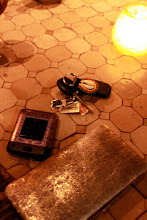I'm now one week into my general surgery rotation, and I've learned a great deal in a short amount of time. Some of the knowledge is clinical, some is more in the life lesson category, and some is simply important knowledge about my own self. In the effort to record what I've learned and perhaps share it with those who might benefit, I've decided to start writing The n00b Files, filled with the edification I gain on clinical rotations. Here's to a great new start.
Lesson 1:
Everyone on the surgery rotation is nicer than the general reputation of surgeons would have you believe. I expected my interns, upper-level residents, and attendings to be much more brusque or impatient with me and my many mistakes, but nearly everyone has been nothing but kind and patient. It's a really nice thing.
Lesson 2:
You're going to mess up at first. It's inevitable. But the nice thing about a month-long rotation is that it gives you ample opportunity to learn from your missteps and do better next time. I think I'm finally starting to be useful to my team, and that feels good.
Lesson 3:
When you're scrubbing into a surgery, you might be asked if you want to double glove. If asked, say yes. Wear a blue pair of gloves as your "under glove," and a white/cream pair over those. The under glove is typically a half-size larger than the over glove, which was somewhat surprising to me, but now makes sense.
Lesson 4:
Being a surgeon basically consists of two main things: actual surgeries and wound care. Nobody becomes a surgeon because they enjoy wound care. Wound care is gross. So basically, if you're not super excited by surgeries, then you probably wouldn't be happy as a surgeon. I'm glad to report that having discovered this, I have confirmed that though surgery is a rotation that's enjoyable and informative, and though I respect surgeons a great deal, I do not want to be a surgeon. It's nice to know that my initial stance was correct.
Lesson 5:
I really, really, really enjoy the clinic setting. Today, during our first day of surgery clinic, I enjoyed myself more than I have throughout the last week. Which isn't to say the entire rotation has been a drag so far. It hasn't. Clinic has just been the highlight. Compare this to my interns' advice to avoid clinic at all costs, and you have further evidence that I am not made to be a surgeon.
Lesson 6:
Shockingly enough, waking up at 4:20 AM isn't all that horrible. It helps that the first few hours after I get to the hospital keep me very busy, so I don't have a chance to get sleepy. It also helps that I go to bed around 9 PM every night now.
Lesson 7:
While free food was the best thing ever during pre-clinicals, free coffee is the best thing ever during clinicals. I probably drink too much coffee now. I should start putting in less sugary creamer so that I don't get fat off of coffee alone...
Lesson 8:
The laparoscopic camera is pretty confusing to drive, and the medical student often has the privilege of driving it during surgeries. You can get some explanation of the camera prior to surgery, but try to ask someone to give you a quick run-down on how it works when you're scrubbed in. The scrub tech is a good resource for this (at least, that was the case in my experience), and knowing how it works will not only make you more useful during the surgery, but also make you feel like your upper-level resident doesn't think you're a total n00b.
Lesson 9:
It is truly a privilege to care for patients. It doesn't always seem that way, and I've found it difficult to interact with some of my sicker patients because I simply don't know what to say or how to act when they seem to be in such pain or so badly damaged. But when I finally did start talking to some of them (while changing their wound dressings, for instance), I felt like I was making my own small contribution towards their healing process. It's a nice thing.
Lesson 10:
Life is good when you're doing what you want to do. Weekends are wonderful for seeing friends you're not rotating with. There are always challenges to overcome and more mistakes to be made, but there's little to complain about.
